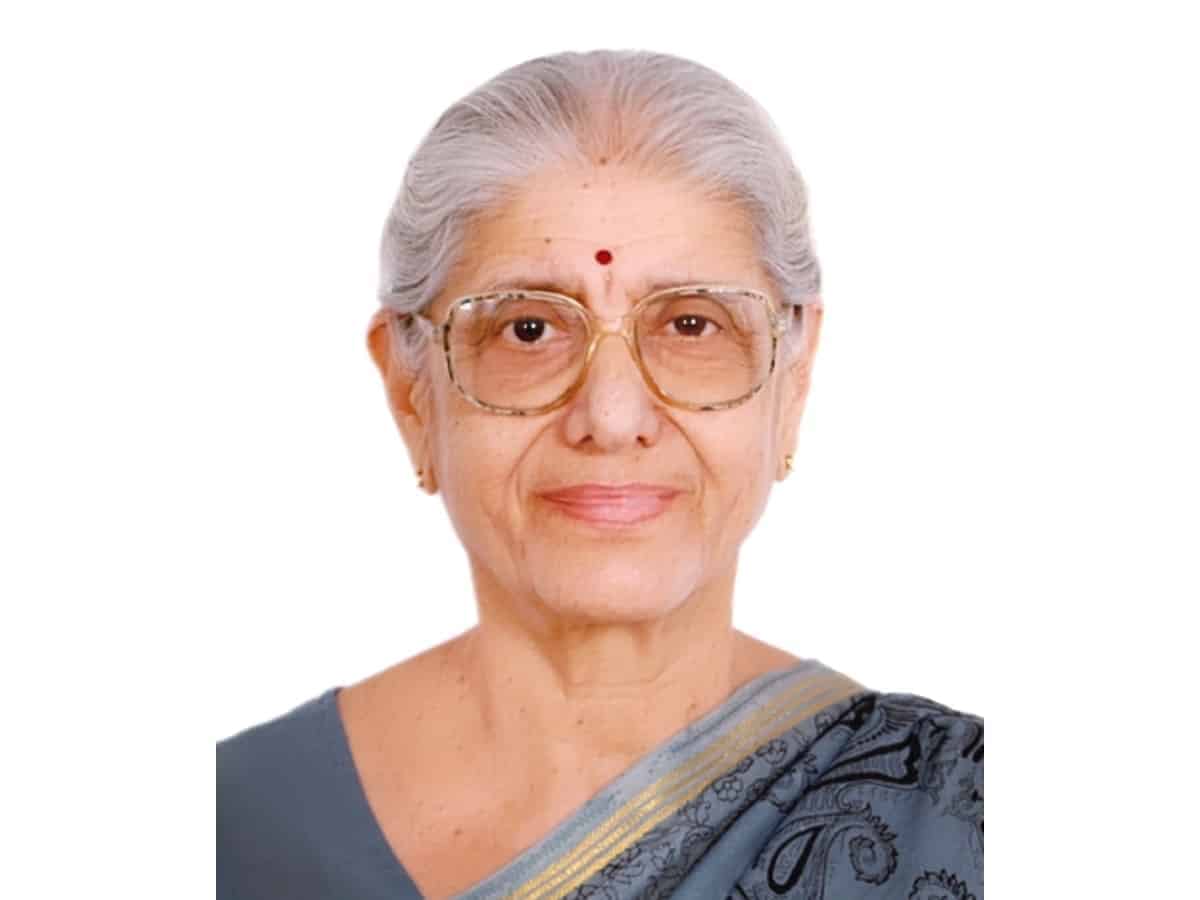
Her walk is sprightly, her voice comes through as firm, but is caring and her commitment and contribution to nutrition studies and the health of the downtrodden is solid. Meet, Dr Mahtab Sohrab Bamji, former Director-Grade Scientist of the National Institute of Nutrition (NIN), Hyderabad, bestowed with the Living Legend of the International Union of Nutritional Sciences (IUNS) recognition in 2017.
The Secretary General, Catherine Geissler, said the award is recognition for those who have significantly contributed to the work of national nutrition society or regional organisation and to the advancement of nutrition at national, regional and global level through professional activities such as research, teaching and services.
As she completes 87 today, Dr Bamji, a spinster, continues to pack her energy and time into social service and health care through the Dangoria Charitable Trust in Hyderabad. It has a hospital in City and operations in Narsapur, on the outskirts of the city in Medak district of Telangana State. She is passionate about her field based work with the poor, especially women and children and farmers, tending to their health and nutrition support.
A workaholic and person of frugal habits, Dr Bamji lives in a compact apartment near the busy RTC X Roads. She has made Hyderabad her home. Having come to join the NIN in 1965, she has spent over half a century, being active in the scientific circles, social work and also the MARCH, (Medically Aware and Responsible Citizens of Hyderabad) started by the late Dr PM Bhargava, C Dayakar Reddy, Dr Kakarla Subba Rao etc. in the 1990s.
Dr Bamji hails from a Parsi family of Bombay. She is among the dwindling numbers of the community in Hyderabad, which after Mumbai and Gujarat hosts the largest number. Among the well known Parsis from Hyderabad that I have known are Dr P M Lentin (94), formerly of the Osmania Medical College and Hospital; fitness expert, Zareer Patel, Lord Karan Billimoria of the Cobra Beer fame, Naushir Mehta (Cricketer) and Rohinton Behramsha, an electronics expert and the owner of Chermas.
NIN, Bamji and their contributions
In the male dominated world of Indian Science, Dr Bamji, has carved a name for herself with outstanding contributions in nutrition and leadership. During the long innings at the NIN (1965-94), she rose to become Director Grade Scientist. She has been listed among the all time top women scientists of India by the Department of Biotechnology (DBT) recently.
Dr Bamji did her graduation in Chemistry, post-graduation in Biochemistry and PhD in biochemistry (1961) from the Bombay University. She moved to the Indian Institute of Science (IISc), Bangalore. During 1962-65, she was in the USA as post-doctoral Fellow/Research Associate at Tufts University Boston and Johns Hopkins University, Baltimore.
In a way Dr Bamji is one of the protégé’s of Dr C Gopalan, considered the doyen of Nutrition Science in India. Among others were Dr Vinodini Reddy, Dr Kamala Krishnaswamy (both became Directors of NIN) and Dr Prema Ramachandran.
A biochemist by training, Dr Bamji has made significant contributions in the field of nutritional biochemistry, particularly, towards the understanding of the aetiology of B vitamins deficiencies, development of tests for assessing vitamin nutrition status as well as for estimating the incidence of B-vitamins deficiency and its daily requirement in the community.
In addition, her work centred on interactions between nutrition and drugs such as contraceptive steroids, and identification of Carnitine as a vitamin. She has published 100 papers, written several book chapters, reviews, popular articles and reports and edited a very popular textbook on human nutrition.
I first met Dr Bamji as a young Reporter of the PTI in Hyderabad during the mid 1980s. As scientist at the NIN she was easily accessible and explained her research work well. The Institute, under the Indian Council of Medical Research (ICMR), had a good number of young researchers, especially women for whom she was not just a motivator but also a guardian for some.
Distinctly recollect one occasion when I reported a story on the troubles facing the Institute’s lab animal house facility. Dr Bamji was quite forthcoming though upset with what had happened. Interestingly, this facility later produced ‘Sumo rats’ in the lab, which proved to be useful in research related to diabetes, under an Indo-US project. Around 2005, the Animal Facility boasted of a few hundred such Obese, Sumo rats, along with other animals for experiments.
Association with Dangoriya Charitable Trust
Post retirement in 1994 she has been associated with the Dangoriya Trust, a well known charitable organisation run by Dr Devyani. Dr Bamji holds the ICMR Emeritus Scientist position as well as the Honorary Scientist of the Indian National Science Academy (INSA).
She has been trying to evolve models for improving health, food, and nutrition and environment security in villages of Medak district, Telangana State, through scientific and technological interventions. With the Trust and support of scientific departments a food processing-cum-training centre has been established to prevent wastage of farm produce for nutrition security and women’s livelihood too.
Cause of women in science & science popularisation
Dr Bamji has been a vocal proponent of greater involvement of women in the sciences. She chaired the DST and DBT committees on Science and Technology for Women; chaired the INSA Committee on Science Career for Indian Women and was the Chairperson of the National Task Force for Women in Science during 2006-2009.
At the same time she was deeply involved in popularisation of science through an active role in organisations such as Indian Women Scientists Association and Jana Vignana Vedika.
She co-chaired the Health Panel for Vision 2020, one of the 17 areas identified by A P J Abdul Kalam, former India President in the Vision 2020 documents brought out by the TIFAC (Technology Information Forecasting and Assessment Council) un 1995. They were intended to transform India from a developing to a developed nation.
Dr Bamji was a Member of Planning Commission 10th and 11th plan working groups and Steering Committee for Science and Technology 11th plan; She also served on the INSA Council (1993-95) and Vice President during 2009-2011.
The tireless and effective interventions of the Trust that started transforming the quality of life of the villagers attracted the attention of the Department of Science and Technology (DST), which presented the national award for Development of women through science and technology.
“Our focus over the years has been on the different aspects of nutrition security — food (crop diversification using green methods of farming, backyard poultry, food processing), environment, health care, livelihood through a holistic approach,” says Dr Bamji with a sense of pride and confidence.
Awards and recognition
Dr Bamji received 21 awards and honours that include: Patwardhan Prize (1973); BC Guha Memorial Lecture Award (1987) and Jawaharlal Nehru Birth Centenary Lecture (1998) of INSA; Srikantia Memorial Oration Award (1999); National Award for Woman Scientist (2000) and; CV Raman Medal of INSA (2005).
Scientific research in the country even today does not attract many women. Exceptions like Dr Manju Sharma, who became Secretary of Dept of Biotechnology apart very few women, have reached the top echelons. The Indian Council of Medical Research was led by Dr Soumya Swaminathan, who now is the Chief Scientist at the WHO & the Secretary, DBT is Dr Renu Swarup.
Indian science requires more youngsters, especially women to power it into the future. At present information technology and computer sciences rule. The science, in general as a career comes a distant second. The contributions and zeal of Dr Bamji should be an inspiration.
Somasekhar Mulugu, former Associate Editor & Chief of Bureau of The Hindu BusinessLine, is a well-known political, business and science writer and analyst based in Hyderabad.

